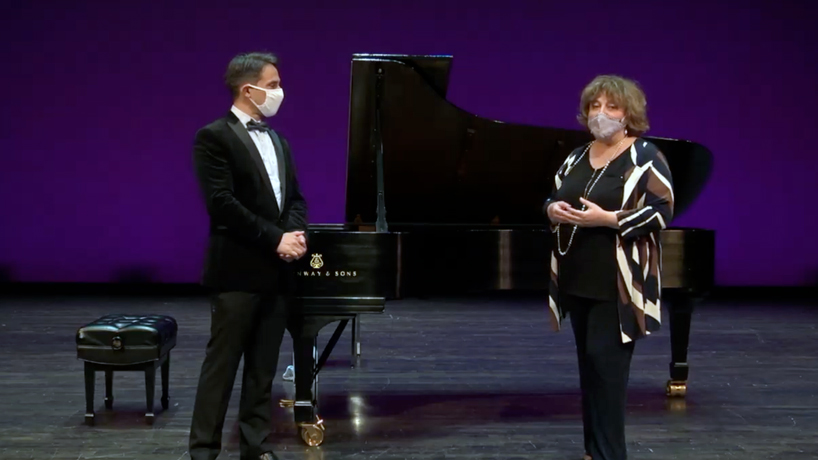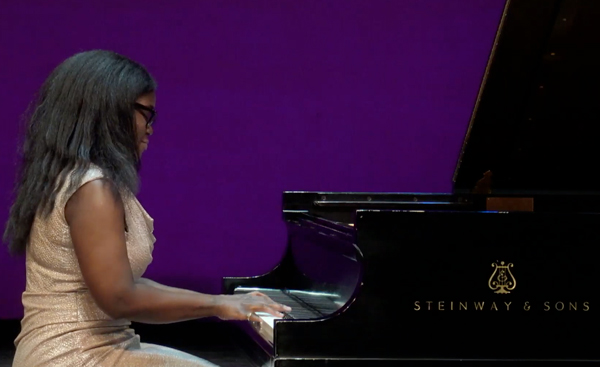
Darwin Aquino director of the UMSL Symphony Orchestra and Alla Voskoboynikova, director of keyboard studies, hosted the virtual concert Tuesday evening. UMSL piano students performed music from legendary Latin American composers such as Ernesto Lecuona and Heitor Villa-Lobos. Voskoboynikova also premiered an original piece composed by Aquino called “Subito Papillo.” (Screenshots)
After stepping onto the darkened stage of the Lee Theater at the Blanche M. Touhill Performing Arts Center, Alla Voskoboynikova posed what could have been a difficult question to Darwin Aquino: Why is the music of Latin America so enjoyable?
Aquino answered deftly without missing a beat.
“The folklore is so important in our countries,” the native of the Dominican Republic and director of the University of Missouri–St. Louis Symphony Orchestra said. “We dance a lot. We sing a lot. Everything in Latin America is a little gathering – a little party. All that is part of who we are, is part of our culture, and I believe that’s why this music is so enjoyable.”
It was just a taste of the insight he and Voskoboynikova, director of keyboard studies at UMSL, offered while hosting the UMSL Piano Studio’s “Music of Latin American Composers” virtual concert Tuesday evening.
Dozens tuned into the event livestreamed from the Touhill to hear UMSL piano students perform the music of composers from Argentina, Brazil, Cuba, the Dominican Republic and Mexico. In addition to those works, Voskoboynikova premiered a piece written by Aquino.
Before introducing the first student performance, Voskoboynikova noted that many people felt fortunate because so many Latin American composers wrote music specifically for the piano. Aquino also elaborated on the history and spirit of the music.
“Latin American music is – I believe – the perfect mixture of European culture and African culture,” he said. “That’s why we can hear beautiful melodies. Some European piece by a classical composer is tonal music, but at the same time, you have those energetic rhythms from African culture. Sometimes they don’t have the accent on the strong beat, but they do have the accent or the emphasis on the weak, and that’s why we want to dance to this music.”
The concert began with Yuexin Pan’s prerecorded rendition of the lilting, romantic “Milonga del Angel” by Argentine composer Astor Piazzolla. The concert then returned to the live stage at the Lee Theater, where April Sun performed “Valse Bluette, opus 12, No. 2” by Ricardo Castro. Castro, a Mexican composer, authored the first Latin American piano concerto and was known to weave in passages of virtuosity into his work.

Ginger Edwards performs “Tristorosa” by Heitor Villa-Lobos, an A-minor waltz.
Ginger Edwards took the stage next. While introducing her piece, “Tristorosa” by Heitor Villa-Lobos, she enthusiastically encouraged viewers to start box-stepping if the mood struck them.
“This is an A-minor waltz, so I hope that you love that,” she said. “If you want to get up and waltz while I’m playing, feel free to do so.”
Villa-Lobos, a Brazilian, is probably the best-known and most prolific South American composer of all time. His music was often influenced by the European classical tradition, while also incorporating Brazilian folk melodies and themes.
Miho Tago presented the work of Alberto Ginastera, another South American, next. Ginastera drew inspiration from Argentina’s Gaucho tradition, which is exemplified in “Danzas Argentinas, opus 2,” a set of three dances.
Tago nimbly worked her way through each dance, starting with the frenetic “Danza del viejo boyer.” She then moved to the more melancholic “Danza de la moza donosa” before concluding with “Danza del gaucho matrero,” which balanced the frenetic energy of the first dance with joyful exuberance.
Jiaping Hu also chose to perform multiple pieces, playing three movements from Ernesto Lecuona’s “Suite Andalucía.” Before sitting at the piano, Hu expressed his connection to the first movement, “Córdoba.”
“It is the name of the place in Spain, and the melody is breathtaking,” he said. “You can imagine how beautiful Córdoba is. The mood is a little sad. You can hear some sorrow, and sometimes when I practice, I think of my family in China, especially my grandpa.”
The next two movements, “Andalucía” and “Malagueña,” were heavily influenced by Andalusian folk music such as Flamenco. The melody of the latter would become familiar to many as “The Breeze and I,” a song popularized by Caterina Valente in the 1950s.
Voskoboynikova closed the concert with “Romanza de Amor” by Mexican Manuel Ponce and Aquino’s original piece, “Subito Papillo.” Aquino explained that the title refers to the Italian musical term “subito piano,” which translates to “suddenly soft.”
Aquino decided to put a playful twist on the term.
“I have a friend from the Dominican Republic, and it has been a path in my life as a composer to compose music for friends and colleagues and to capture little moments of life,” he said. “His name is a Manuel Garrido. He is a composer from the Dominican Republic. Performing one of his pieces, we started joking about this dynamic of subito piano. I call him Papillo, Papillo is a nickname in the Dominican Republic, and we started joking about ‘subito piano‘ and ‘subito Papillo’ at the same time.”
Voskoboynikova provided a theatrical flair to the tropical waltz, striking the keys with authority and relenting quickly during the “subito piano” to put an index finger to her lips, as if to say, “Shhhh.”
Aquino was thrilled to premiere the piece but equally happy to introduce the audience to the region’s storied composers.
“Actually, many of the pieces that we have listened to tonight are St. Louis premieres, as well, so a very special night to share music from Latin America,” he said.
Watch the whole performance by clicking below:














